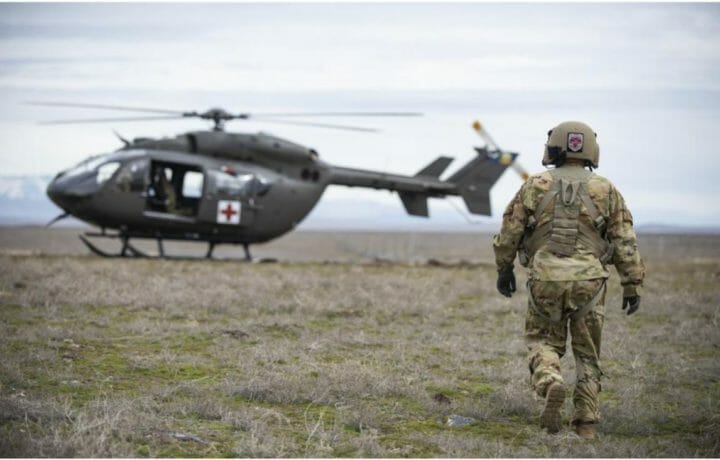Last fall, the United States Army issued a request for information (RFI) to industry to determine how to reduce costs and increase efficiency in training for rotary-wing pilots as part of the Flight School Next initiative. The service has also sought to conduct trials of training systems that could eventually replace its fleet of Airbus UH-72 Lakota helicopters, the military version of the Eurocopter 145.
The Lakota was selected as the winner of the Army’s Light Utility Helicopter (LUH) program in June 2006, and it has been used in non-combat logistics and support missions within the United States for homeland security, disaster response, and medical evacuation missions.
Since 2021, the UH-72A model has also been used for helicopter pilot training, replacing the TH-67 that had been in use in that role since the 1960s. However, a National Commission on the Future of the Army study conducted for U.S. lawmakers concluded that there are cheaper options, and that the Lakota may be “too much aircraft for the mission.”
One issue has been that the UH-72A is a very advanced helicopter, which officials have warned almost flies itself. Instead, the service has called for a simpler, single-engine, basic helicopter that will deliver better-skilled pilots.
Cost has also been cited as a factor, with the UH-72A costing nearly $3,000 per flight hour, almost the same as the UH-60 Black Hawk. The service has sought to reduce operating costs, with a goal of bringing them down to $500 to $1,300 per hour.
New Bids Coming
On June 3, the U.S. Army initiated a five-month deadline for companies to submit bids for the replacement of the UH-72A Lakota helicopters. The United States Army Aviation Center of Excellence (AVCOE) issued its public notice for the U.S. Army Initial Entry Rotary-Wing (IERW) Flight Training, also known as Flight School Next (FSN), located at Fort Novosel, Alabama.
It follows the RFI from last December and was meant to represent a strategic approach to enhancing military flight training.
“The AVCOE will be pursuing a Contractor-Owned Contractor-Operated (COCO), commercial, turnkey solution to replace the current IERW Common Core flight training for the Army. The U.S. Army is looking to industry to provide solutions and methodologies that cover contractor-provided academic instruction, flight instruction, Training Aids and Devices, simulation (if required), aircraft, aircraft parts, and aircraft maintenance,” the public notice stated.
Bids are due by October 31.
U.S. Army Revamping Pilot Training
The U.S. Army has also begun to overhaul its training of new pilots, with a renewed emphasis on fundamentals. This follows the fatal January 29, crash in Washington, D.C., in which a U.S. Army Black Hawk collided with an American Airlines passenger jet near Reagan National Airport.
There have been other aviation mishaps, and the Army has wanted a return to rigorous training and safety, which Flight School Next would be a crucial piece.
“I think I have one sacred responsibility and that is to deliver competent aviators to the government,” Maj. Gen. Clair Gill, commander of the Army Aviation Center of Excellence Command, said at an Army aviation conference in Nashville, Tennessee, last month, Defense News reported. “I’m not sure that I’m doing that in spades right now.”
Flight School Next could be part of that as it promises to modernize a training curriculum that has remained essentially unchanged since the 1960s. It appears to be embracing innovation and prioritizing foundational flight skills to help produce a new generation of highly proficient aviators. Beginning soon, those aviators may have a new chopper to train on.
Although no companies are known to have applied yet, Army market surveys have indicated that several aerospace firms are expected to submit bids. These may include Airbus, Boeing, Bell, Leonardo, Lockheed Martin, and Robinsons, among others.



